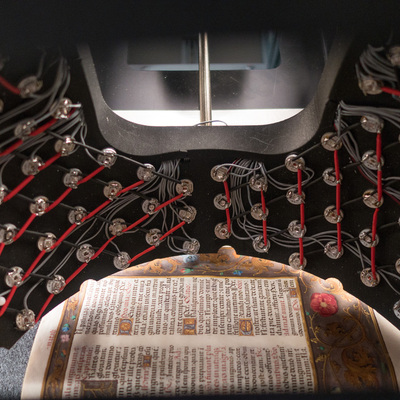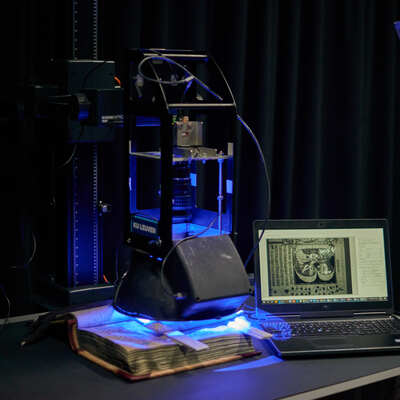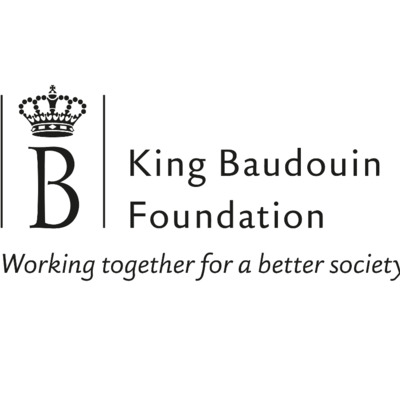Het Project rond het Brevier van Geraardsbergen is een samenwerking van de Abdij van Maredsous, de Universiteit van Leuven en het Koninklijk Instituut voor het Kunstpatrimonium. Het project kreeg de steun van het Fonds Baillet Latour.
Onze partners

Het Project rond het Brevier van Geraardsbergen is een samenwerking van de Abdij van Maredsous, de Universiteit van Leuven en het Koninklijk Instituut voor het Kunstpatrimonium. Het project kreeg de steun van het Fonds Baillet Latour.


De Abdij van Maredsous werd in 1872 door benedictijnenmonniken gesticht in de vallei van de Moligée. Ze is een typisch voorbeeld van de neogotiek en past harmonieus in de beboste en glooiende omgeving van de streek. De gebouwen van de abdij van Maredsous ademen spiritualiteit, in een sfeer van rust en toewijding die niemand onverschillig kan laten. De kerk die boven het klooster uittorent, het klooster zelf en de bibliotheek, de bijgebouwen, waaronder de oude kunstnijverheidschool, het Onthaalcentrum Saint-Joseph, vormen een harmonieus geheel dat de bezoeker uitnodigt tot wandelingen en bezinning.
KU Leuven will celebrate its 600th anniversary in 2025, making it one of Europe’s oldest universities. Our institution has the double honour of being the oldest university in the Low Countries and the oldest extant Catholic university in the world. The University that is now known as KU Leuven was founded with the papal bull ‘Sapientiae immarcessibilis’. This was issued by Pope Martin V on 9 December 1425 after the city of Leuven had requested permission for the foundation of the University with the support of John IV, Duke of Brabant, and the city’s clergy. Today, KU Leuven accommodates 50,000 students, spread across the various campuses in Leuven and elsewhere in Flanders. For research, KU Leuven ranks among the world’s finest. KU Leuven has become a cosmopolitan institution in a rapidly changing urban environment. Its unique profile reconciles cutting-edge science with quality of life and openness to talent.
The Faculty of Theology and Religious Studies is responsible, within the Catholic University of Leuven, for the development and coordination of academic formation, research, and scientific service in the field of theology and religious studies. The Faculty contains five Research Units: Biblical Studies, Systematic Theology and the Study of Religions, Theological and Comparative Ethics, History of Church and Theology, and Pastoral and Empirical Theology. These Research Units have been entrusted with the teaching of theology and religious studies in the Faculty programmes, with research, with the formation of research personnel, and with social and ecclesiastical services related to each discipline.


Het KIK (Koninklijk Instituut voor het Kunstpatrimonium) is een federale non-profit instelling die zorg draagt voor het Belgisch erfgoed: kunst, gebouwen en betekenisvolle objecten uit ons verleden. Deze prachtige én onvervangbare creaties belichamen onze gedeelde geschiedenis en dragen onze identiteit als samenleving. Daarom geloven we bij het KIK dat kunst de emotie opwekt die ons allemaal verbindt. Om de schoonheid en betekenis van ons erfgoed te onthullen, en om het duurzaam te bewaren, streven we bij het KIK naar de hoogste vormen van onderzoek en conservatie-restauratie. Enkel dankzij die goede zorgen, in een geest van gedeelde verantwoordelijkheid en duurzame ontwikkeling, kunnen we vele toekomstige generaties laten genieten van hún erfgoed. Het is onze opdracht om dit kostbare geschenk uit het verleden zorgzaam door te geven aan al wie na ons komt. Interdisciplinaire synergie vormt al sinds 1948 het onwrikbare fundament voor onze toegewijde experts, gedreven door een vurige passie voor erfgoed en wetenschap. Met een veelzijdig gamma aan expertises en geavanceerde technologie gaan we samen aan de slag om erfgoed in al zijn aspecten te begrijpen en via preventieve conservatie en conservatie-restauratiebehandelingen in optimale staat te houden of te brengen. Daarnaast zorgt het KIK voor brede kennisdeling over kunst en erfgoed en de technologie van onderzoek en conservatie-restauratie. Erfgoed raakt ons allen, en die verbindende boodschap willen wij actief uitdragen.
The Book Heritage Lab KU Leuven, is an innovative expertise lab of KU Leuven for research and conservation of manuscripts, early printed books and documentary heritage. The Book Heritage Lab focuses on diagnosis and research of the material history of medieval and early modern paper and parchment artefacts, with a special focus on book archeology, production, preservation, scientific imaging and conservation. In the lab between 2018 and 2020 the charters of the Old University were studied and conserved. The Book Heritage Lab is located in the Maurits Sabbe Library of the Faculty of Theology and Religious studies and is founder of VIEW - KU Leuven Core Facility of Heritage Science & Digitisation Technologies.


VIEW KU Leuven Core Facility for Heritage Science and Digitisation Technologies represents a collaboration between the Book Heritage Lab (Faculty of Theology and Religious Studies) and the Imaging Lab (KU Leuven Libraries). Through this collaboration, scholars will obtain access to the infrastructure and expertise of both Labs, and be supported in innovative and interdisciplinary research on heritage materials both in physical and digital form.
The Imaging Lab is part of KU Leuven Libraries, and is optimally equipped for the digitization of fragile and precious (mainly documentary) heritage materials, with a special focus on high quality. Its room is climate-controlled and secured, ensuring a safe digitisation environment, and its equipment state-of-the-art. This allows for an optimal constellation of infrastructure for imaging, suited to the nature and physical state of the original objects. The Imaging Lab is co-founder of VIEW - KU Leuven Core Facility of Heritage Science & Digitisation Technologies.


llluminare (KU Leuven) is a research and documentation centre, located in the Leuven University Library. The focus on medieval and early modern art from the Low Countries in a European perspective is facilitated by both research and doctoral projects that are supported by an international network of universities, institutions, and museums. Illuminare conserves and catalogues illuminated manuscripts and carries out art technical research. It examines, through an interdisciplinary approach, the iconology of medieval art. It holds several research archives of renowned art historians, and organises national and international exhibitions.
LIBIS originated in 1973 as a support service for the KU Leuven libraries. The past decennia, it has grown from its university framework into an important player in the field of information solutions. Today, several institutions centered on the transfer of knowledge, have found a suitable partner in LIBIS for the sustainable management and improvement of accessibility of their collections. LIBIS partners with scientific, private and public organisations: whether it be libraries, archives, museums or cultural organisations, their goal is to develop modern and user-friendly solutions for the management of their collections.


Belgium can boast a remarkable wealth of heritage in terms of museums and buildings. To help preserve that heritage, the Baillet Latour Fund decided in 2000 to finance the restoration of buildings and works of art with a special historic, artistic and cultural significance. In partnership with the King Baudouin Foundation, which has placed its heritage expertise at the Fund’s disposal, an annual selection is made of projects to which the Fund will be lending its support so that the masterpieces in these projects can continue to attest to the excellence of human endeavour underpinning them. This programme was initiated in 2002. Since then, the Fund has collaborated on more than eighty important projects, including the restoration of the Bible of Anjou, the restoration of the Rubens paintings held at the Royal Museums of Fine Arts of Belgium, the Lambert Lombard series The Virtuous Women and The Seven Sacraments by Rogier van der Weyden.
The King Baudouin Foundation’s mission is to contribute to building a better society in Belgium, Europe and elsewhere in the world. The Foundation is an actor for change and innovation, serving the public interest and increasing social cohesion. We endeavour to maximise our impact through capacity building among organisations and people who contribute to building a better society. We encourage effective philanthropy among individuals and businesses in Belgium, Europe and around the world. Our programmes are long-term and cover a number of fields: Social justice and poverty, health, heritage and culture, social commitment, international education and development of talents, Europe, Climate, the environment and biodiversity.
